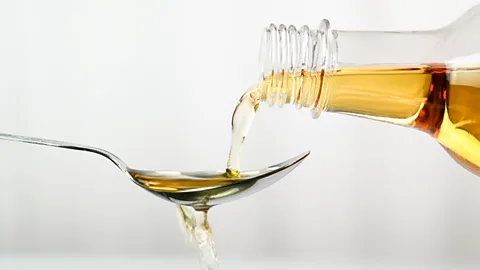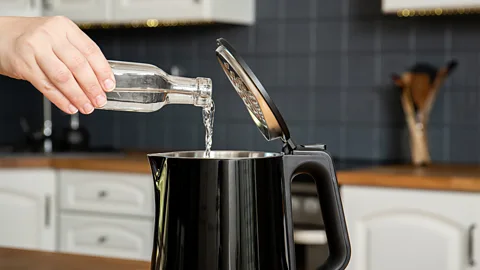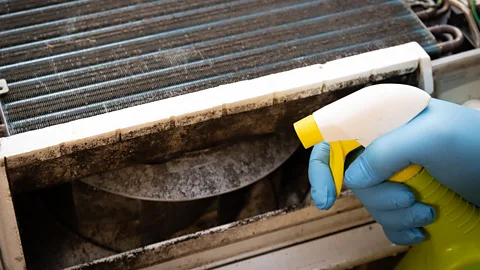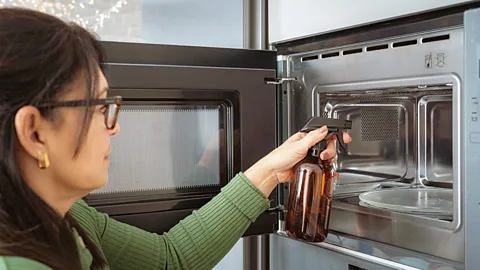'Its strength is its simplicity': The benefits of cleaning with vinegar
 Getty Images
Getty ImagesKatarina Zimmer put vinegar to the test as a cleaning product and discovered a wide range of benefits, for people and the planet.
A few months ago in my new Berlin apartment, my toilet and I were at war. No amount of scrubbing or toilet cleaner would evict the limescale coating inside. Frustrated, I turned to Google and stumbled across a page recommending vinegar – something that the previous inhabitant had left behind in abundance. After dropping two tablespoons full of "Essigessenz" – essentially concentrated vinegar – into the toilet and waiting for half an hour, I scrubbed and the limescale came off in a moment.
Since then, I've enthusiastically used vinegar to rid my world of limescale. I've found it even more effective than my regular kitchen spray cleaner for getting my sink sparkling. That includes the faucet, which I wrapped in a vinegar-soaked kitchen tissue – whereas my regular cleaning spray dribbled off. And rather than having to buy special tablets to clean my limescale-smothered glass kettle, I simply poured two tablespoons of concentrated vinegar inside and boiled it. As the limescale crackled off, it made a satisfying sizzling sound.
I wondered if vinegar had other advantages. Did it also kill off bacteria and other germs? And, importantly, was this simple, natural product better for the environment and for my health than regular cleaning products?
The internet is full of sustainability influencers and green cleaning blogs that advertise vinegar as a jack-of-all-trades and a safer and "greener" alternative to "toxic" cleaning products. These claims make sense on the surface; vinegar is after all just fermented alcohol and has long been used as a food preservative, in salad dressings, as well as a household cleaner – but I wanted evidence. After interviewing three experts, I learned that while some of these claims are true, the benefits of vinegar depend a lot on how it's used and the kind of grime you're trying to get rid of.
 Getty Images
Getty ImagesReassuringly, Eric Beckman, a chemical engineer and emeritus professor at the University of Pittsburgh in Pennsylvania, told me that the best cleaning use for acetic acid – the main component of vinegar – is exactly what I had been using it for: as a descaler. Limescale – and rust, for that matter – consists of certain ions that dissolve more easily in acidic fluids like vinegar, he says. Beckman uses vinegar himself to get limescale off mirrors, while the microbiologist Dirk Bockmühl of Germany's Rhine-Waal University of Applied Sciences prefers using lemon juice, which contains citric acid, which he says is a more effective descaler and smells better. (Read more about why vinegar is such an effective cleaner.)
That said, vinegar doesn't work on everything. Beckman says that soap does a better job at removing oily films on dishes, while baking soda is effective against processed oils that have stuck onto surfaces while cooking. (Read more about whether baking soda is environmentally friendly).
However, Beckman expresses exasperation about a popular remedy of mixing vinegar together with baking soda. The mixture is chemically quite useless, he says, as the acid of vinegar and the base of baking soda effectively cancel each other out. "I use both, but not together," says Beckman. "Together, they give you nothing."
And while vinegar is often touted as a powerful antimicrobial, Bockmühl says, the truth is more nuanced. In a 2020 study, Bockmühl and his colleagues put vinegar to the test against a selection of disease-causing bacteria, viruses and fungi. While many internet recommendations suggest adding a dash of vinegar into a bucket of water for cleaning, Bockmühl found that its anti-microbial effects only kick in at an acetic acid concentration of 5% – its concentration in pure vinegar. And it was only fully effective at distilled concentrations of 10% – to which the researchers added a dash of citric acid – in killing off five common bacteria, including Escherichia coli and Staphylococcus aureus, as well as a mould, a yeast and a weakened strain of the vaccinia virus. Other studies have found that similar concentrations also work against Sars-CoV-2, the virus that causes Covid-19.
But even these concentrations didn't work against the MRSA bacterium, an especially stubborn strain of Staphylococcus aureus that's resistant to certain antibiotics, while countless bacteria remain untested. Many bacteria – including the ones that ferment alcohol into vinegar – thrive in acids, Beckman adds: "Then they'll be like, 'ooh, yay, vinegar.'" Some moulds, too, are resistant to acetic acid while some viruses – like norovirus – might be, too, Bockmühl suspects. Beckman says that soaps are more effective against bacteria, while standard disinfectants work better against viruses and moulds. Harsh treatments like bleach will definitely kill everything, Beckman says – although bleach can be unsafe if used incorrectly.
 Getty Images
Getty ImagesBockmühl stresses that, even for the germs that vinegar does kill, a relatively high concentration is needed. The concentration won't be adequate "if you just put a teaspoon of vinegar into your cleaning solution", Bockmühl says.
However, the higher the dose of acetic acid, the more irritating it can be on the skin, he adds. It is harmful if it gets into your eyes. Surfaces can suffer, too: vinegar corrodes natural stone and metals like copper, bronze and brass, according to the Italian chemist Dario Bressanini's book The Science of Cleaning. And in dishwashers or washing machines, it can harm the rubber gaskets used to seal them, while it could also damage coffee machines and strip away the coating on tiles and grout, Bressanini writes. But Bockmühl assures me that it's fine to use vinegar on glass and ceramic surfaces – like my toilet – and stainless steel sinks.
The trouble that Bockmühl sees with using homemade cleaning products is that they don't come with instructions or safety recommendations. "They might be safe if you know what you're doing," he says, "but there are a lot of really stupid and absurd recommendations on the internet".
More like this:
• Are you cleaning your water bottle enough?
To learn more about how the health risks of vinegar compare with those of conventional cleaners, I called up Nicola Carslaw, professor of indoor air chemistry at the University of York in the UK. Her concern is how cleaners disrupt the air in our homes and buildings. It's known that professional domestic cleaners tend to have higher rates of asthma than other occupational groups, although it's proven difficult to pin that on any single product or ingredient.
In a recent study, Carslaw and her colleagues tested 23 different cleaning products including dishwasher fluid, washing up liquid and spray products, and found that many of them released volatile chemical compounds (VOCs). Some of these compounds, like terpenes, are often added to give pleasant aromas, such as lavender or pine oil, but they're highly reactive in the atmosphere. Terpenes for instance, easily react with ozone in the air, creating miniscule particles. In general, inhaling particles of this size has been linked to lung and heart disease.
"Your nose is a really good filter for the big particles, but the smaller ones can get all the way into your lungs [and] into the bloodstream," Carslaw says. Interestingly, in her study she found that cleaning products marketed as "natural" or "green" didn't seem any healthier in this regard. "The natural/green ones had as many, if not more VOCs as the standard cleaners, and in many cases they were more reactive," she says.
But vinegar, by contrast, only consists of water and acetic acid (and a few other substances that make the difference between red and wine vinegar, for instance). As such, "it's just not going to be chemically reactive in the same way", Carslaw says. Another advantage of vinegar is that it's usually applied on a cloth to wipe surfaces rather than used as a spray, Carslaw adds. Research shows that cleaning products applied in spray form have more harmful effects on the respiratory system than liquids and wipes. (Read more about the health risks associated with cleaning products in Jessica Bradley's story).
"When you spray something, you're turning the chemical into a form that's much easier to breathe [in] than if you have the liquid," Carslaw says. That said, she always advises gloves when there's risk of skin contact, good ventilation and avoiding excessive cleaning, whatever product is used. (Read more about whether we're cleaning too much for our own good).
 Getty Images
Getty ImagesThis all left me with one remaining question: is using vinegar more environmentally friendly than conventional cleaners?
That's a hard question to answer, says Beckman. Ideally, there would be life cycle analyses for cleaning products which track impacts from cradle to grave, tracing each ingredient back to its source, how it's produced, transported, packaged and eventually disposed of. But very few companies do that thoroughly, even if they do brand their products as "green", Beckman says.
"But I will say this about vinegar. [Its] strength is its simplicity," Beckman says. Conventional cleaners can consist of more than a dozen different ingredients, many of them industrially manufactured in energy-consuming processes, he says. Acetic acid is born through the natural, yeast-driven fermentation of alcohol, which itself comes from the natural fermentation of sugar. The biggest environmental impact of vinegar-making is where the sugar came from – whether it's grapes, apples, grains, potatoes, or rice – which are largely renewable resources. Bockmühl cautions that this only applies to naturally fermented vinegars, the ones typically sold as food products; there are also synthetic vinegars which are derived from fossil fuels, meaning they come with all the environmentally harmful impacts of oil and gas extraction.
Even at the very end of its life, vinegar has little impact. While many ingredients in soaps are tough molecules and don't easily biodegrade, sometimes continuing to kill organisms once they're in the environment, vinegar quickly breaks down, Beckman says. "Vinegar passes muster on any sustainability scale because it's simple and it's degradable," he says.
After discovering all of this, I felt even better about using vinegar. I probably won't rely on it for ridding my surfaces of germs, but I'll keep using it to remove limescale and look forward to trying it out on the next rusty item I find. I'm happy to put up with the smell, knowing that I'm using a sustainable product that's likely better for my health.
--
For essential climate news and hopeful developments to your inbox, sign up to the Future Earth newsletter, while The Essential List delivers a handpicked selection of features and insights twice a week.
